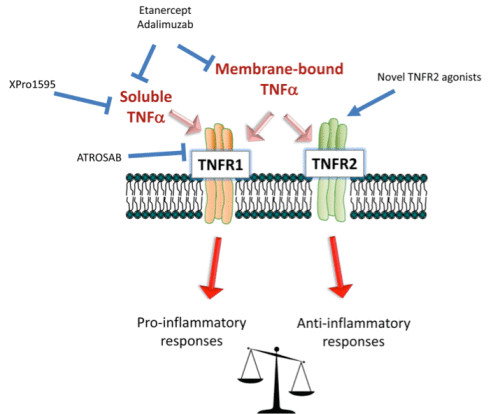Current Research
The aim of our lab is to develop novel immunomodulatory and neuroprotective strategies for the treatment of autoimmune disorders such as multiple sclerosis, using the animal models of experimental autoimmune encephalomyelitis/autoimmune optic neuritis. Some examples are given below:
Targeting of TNF receptor signalling to modulate neuroinflammation
TNFα is an important master regulator of the initiation and perpetuation of chronic inflammation. Although anti-TNF therapies are used successfully to treat certain autoimmune diseases, trials in MS patients have resulted in unexpected, and unwanted outcomes. It is now clear that these results arise from the opposing effects mediated by TNF signalling; whilst acting via TNFR1, TNF exerts proinflammatory effects, whereas TNF signalling via TNFR2 promotes immune-regulation as well as neuroprotection and remyelination. Together with our collaborative partners in Stuttgart (Prof. Klaus Pfitzenmaier and Prof. Roland Kontermann) who have developed candidate compounds to inhibit the detrimental actions and promote the beneficial actions of TNF we are testing their efficacy under autoimmune inflammatory conditions with promising results.
 |
| Figure 1. Combination of agonistic and antagonistic targeting of TNFR signalling can modulate the balance of pro- and anti-inflammatory outcomes. |
Erythropoietin study
Methylprednisolone pulse therapy is the standard treatment for acute optic neuritis in patients, however it has limited effects on influencing the outcome of parameters such as visual outcome and optic nerve atrophy. Additionally, animal studies have demonstrated that although methylprednisolone effectively controlled CNS inflammation, it actually increased RGC degeneration by inhibiting endogeneous neurotrophin-dependent pathways. In order to improve the outcome of methylprednisolone treatment, we firstly demonstrated in an animal model that co-treatment with both methylprednisolone and erythropoietin, a glycoprotein hormone with neurotrophin-like properties, led to improved visual function and RGC survival. Based on these findings, we next tested the safety and efficacy of erythropoietin as an add-on therapy to methylprednisolone in patients presenting with their first episode of autoimmune optic neuritis. In this phase II trial, co-treatment with methylprednisolone and erythropoietin resulted in a significant improvement in retinal nerve fibre thinning over a period of 16 weeks compared to methylprednisolone treatment alone. We have now initiated a larger phase III trial to test this add-on therapy in a larger cohort of patients over a longer time frame.

